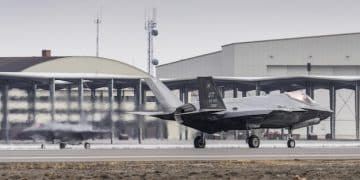Artificial Intelligence in Military Drones: Ethical and Strategic Analysis for US Air Force

Artificial Intelligence in Military Drones: Analyzing the Ethical and Strategic Implications for the US Air Force involves examining how AI is transforming military operations, raising critical ethical concerns, and impacting the strategic decision-making within the US Air Force.
The integration of artificial intelligence (AI) into military drones represents a significant technological leap, particularly for the US Air Force. This advancement promises enhanced capabilities and strategic advantages, but it also introduces complex ethical and operational challenges. Understanding these implications is crucial for responsible deployment and effective utilization.
Understanding Artificial Intelligence in Military Drones
Artificial intelligence (AI) is rapidly changing the landscape of military technology, and its application in drones is particularly noteworthy. Drones, also known as unmanned aerial vehicles (UAVs), equipped with AI, can perform a variety of tasks more efficiently and effectively than traditional systems. This section delves into the core aspects of Artificial Intelligence in Military Drones: Analyzing the Ethical and Strategic Implications for the US Air Force, examining what AI brings to the table and how it’s reshaping military operations.
AI Capabilities in Modern Military Drones
AI enhances the capabilities of military drones in several key areas, including autonomous navigation, target recognition, and data analysis. These advancements allow drones to operate with minimal human intervention, making them invaluable assets in various scenarios.
- Autonomous Navigation: AI enables drones to navigate complex environments without constant human control, using algorithms to avoid obstacles and adapt to changing conditions.
- Enhanced Target Recognition: Machine learning algorithms allow drones to identify and track targets with greater accuracy, even in challenging conditions.
- Real-time Data Analysis: AI processes vast amounts of data collected by drones, providing actionable intelligence to commanders in real time.
These capabilities collectively improve the speed and efficiency of military operations, as drones can perform tasks such as surveillance, reconnaissance, and even targeted strikes with greater precision and less risk to human personnel.

In summary, artificial intelligence is revolutionizing military drones by enabling autonomous operations, improving target recognition, and enhancing data analysis, thereby increasing the effectiveness and efficiency of these unmanned systems.
The Strategic Advantages of AI-Powered Drones for the US Air Force
The integration of AI into military drones offers significant strategic advantages for the US Air Force. These advantages range from improved situational awareness to enhanced operational capabilities, making AI-powered drones an essential component of modern military strategy. Let’s explore the specific ways in which AI boosts the US Air Force’s strategic position, considering Artificial Intelligence in Military Drones: Analyzing the Ethical and Strategic Implications for the US Air Force.
Improved Situational Awareness
AI enhances the ability of drones to gather and process intelligence, providing commanders with a more comprehensive understanding of the battlefield. This improved situational awareness allows for better-informed decision-making and more effective responses to threats.
Enhanced Operational Capabilities
AI-powered drones can perform missions that are too risky or complex for manned aircraft. Their ability to operate autonomously and adapt to changing conditions makes them invaluable assets in a wide range of scenarios.
- Increased Precision: AI algorithms allow drones to strike targets with greater precision, reducing the risk of collateral damage.
- Reduced Risk to Personnel: Unmanned drones can be deployed in dangerous environments, minimizing the risk to human pilots.
- Persistent Surveillance: Drones can maintain continuous surveillance over strategic areas, providing ongoing intelligence and early warning of potential threats.
The strategic advantages of AI-powered drones extend beyond individual missions, contributing to a more agile and responsive military force capable of adapting to evolving threats.
To conclude, AI-powered drones offer the US Air Force improved situational awareness and enhanced operational capabilities, leading to more effective and strategic military operations.
Ethical Concerns Surrounding AI in Military Drones
While AI-enhanced military drones provide numerous strategic advantages, they also bring about significant ethical concerns. These moral considerations span from the potential for unintended harm to questions about accountability in autonomous decision-making. A deep dive into these issues is essential in Artificial Intelligence in Military Drones: Analyzing the Ethical and Strategic Implications for the US Air Force, ensuring that technological advancements align with ethical responsibilities.
The Risk of Unintended Harm
One of the primary ethical concerns is the risk of unintended harm resulting from the use of AI in military drones. AI algorithms, while sophisticated, are not infallible and can make errors in target identification, leading to civilian casualties or other unintended consequences.
Accountability and Autonomous Decision-Making
The increasing autonomy of AI-powered drones raises questions about accountability. If a drone makes a mistake that results in harm, who is responsible? The programmer? The commander? Or the AI itself?
These ethical concerns are not merely theoretical; they have real-world implications for the use of AI in military drones. Addressing these issues requires careful consideration of the potential consequences of AI-driven decisions and the establishment of clear guidelines and safeguards to minimize the risk of harm.

In summary, the use of AI in military drones raises significant ethical concerns, including the risk of unintended harm and questions about accountability in autonomous decision-making. Addressing these concerns is essential to ensure the responsible deployment of AI in military operations.
The Impact of AI on Decision-Making in the US Air Force
The integration of AI in military drones profoundly impacts the decision-making processes within the US Air Force. AI tools offer real-time insights and predictive capabilities, but they also introduce challenges related to trust, oversight, and the potential for bias. Understanding how AI is changing decision-making is critical in Artificial Intelligence in Military Drones: Analyzing the Ethical and Strategic Implications for the US Air Force.
AI-Driven Insights and Predictions
AI algorithms can analyze vast amounts of data to provide insights and predictions that would be impossible for humans to generate in a timely manner. This capability enables commanders to make more informed decisions based on the most up-to-date information.
Challenges of Trust and Oversight
As AI systems become more integrated into decision-making processes, there is a risk of over-reliance on their recommendations. Commanders must exercise careful oversight to ensure that AI-driven decisions align with strategic objectives and ethical considerations. Overtrusting also reduces critical thinking and independent analysis.
- Bias in Algorithms: AI algorithms are trained on data, and if that data reflects existing biases, the AI system may perpetuate those biases in its decision-making.
- Lack of Transparency: Some AI systems operate as “black boxes,” making it difficult to understand how they arrive at their decisions. This lack of transparency can undermine trust and make it challenging to hold the AI system accountable.
- Potential for Error: While AI systems can be highly accurate, they are not infallible. They can make mistakes, especially in complex or unpredictable situations.
By addressing these challenges, the US Air Force can harness the power of AI to enhance decision-making while mitigating the risks associated with its use in military operations.
In conclusion, AI significantly impacts decision-making within the US Air Force, providing valuable insights and predictions but also raising challenges related to trust, oversight, and potential biases.
Regulating AI in Military Drone Operations
Regulating the use of AI in military drone operations is essential to ensure that these technologies are used responsibly and ethically. Regulations must address a range of issues, from the development and testing of AI systems to their deployment and use in combat. Examining how regulations can shape the future of Artificial Intelligence in Military Drones: Analyzing the Ethical and Strategic Implications for the US Air Force is essential for the responsible advancement of this technology.
The Need for Clear Guidelines
Clear guidelines are needed to govern the development, testing, and deployment of AI systems in military drones. These guidelines should address issues such as data privacy, algorithmic bias, and the potential for unintended harm.
International Cooperation
Given the global nature of military operations, international cooperation is essential to ensure that AI is used responsibly and ethically across borders. This cooperation should involve the sharing of best practices, the development of common standards, and the establishment of mechanisms for accountability.
Effective regulation can help to ensure that AI-enhanced military drones are used in a manner that aligns with strategic objectives and ethical considerations, safeguarding against potential risks and promoting responsible innovation.
In summary, regulating the use of AI in military drone operations is crucial to ensure responsible and ethical deployment, requiring clear guidelines, international cooperation, and continuous evaluation.
| Key Aspect | Brief Description |
|---|---|
| 🚀 AI Capabilities | Enhanced navigation, target recognition, and data analysis. |
| 🎯 Strategic Advantages | Improved situational awareness and operational capabilities. |
| 🤔 Ethical Concerns | Risks of unintended harm and accountability issues. |
| ⚖️ Regulation | Clear guidelines and international cooperation are essential. |
Frequently Asked Questions
AI-enhanced drones offer improved situational awareness, enhanced operational capabilities, and the ability to perform tasks with greater precision and less risk to human personnel.
The ethical concerns include the risk of unintended harm, the lack of accountability in autonomous decision-making, and the potential for bias in algorithms.
AI provides commanders with real-time insights and predictive capabilities, enabling more informed decisions. However, it also presents challenges related to trust and oversight of AI systems.
Regulation is essential to ensure that AI technologies are used responsibly and ethically, addressing issues such as data privacy, algorithmic bias, and potential harm.
Mitigation measures include establishing clear guidelines, promoting international cooperation, and continuously evaluating the performance and impact of AI systems.
Conclusion
In conclusion, Artificial Intelligence in Military Drones: Analyzing the Ethical and Strategic Implications for the US Air Force represents a multifaceted challenge, demanding careful consideration of strategic benefits, ethical responsibilities, and regulatory needs. By addressing these critical aspects, the US Air Force can harness the power of AI while upholding its values and ensuring responsible innovation.





